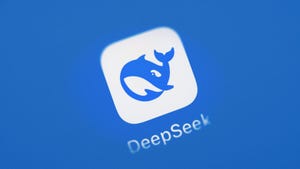VMworld 2018 Roundup: Plenty for the Data CenterVMworld 2018 Roundup: Plenty for the Data Center
The data center's physical presence was very much felt at this year's virtualization lovefest in Vegas.
September 7, 2018

This year's stateside edition of the annual virtualization lovefest that is VMware's VMworld conference in Las Vegas is now history. Given the ubiquitous nature of VMware's offerings (and maybe some of Vegas's lure), it should be no surprise that the roster of companies making a showing usually reads like a Who's Who of the enterprise tech world. This year was no exception. Just about every enterprise tech company that matters was there -- as were many up-and-comers hoping to disrupt the incumbents.
Plenty "big and important" projects, products, and partnerships were announced at the event. There were also some VMworld-related product announcements that didn't come from the event itself, and probably weren't all that the suits at VMware wanted.
Red Hat took the prize in that latter category, when it took aim at the Palo Alto data center software giant with an announcement clearly timed to take advantage of all the VMworld hoopla. On the Thursday before the event's Sunday opening, the open source Linux company announced a three-phased migration plan to help users escape the cost associated with running VMware in favor of its own open source products, namely Red Hat Virtualization for Linux and Windows workloads, Red Hat OpenStack Platform, Red Hat Hyperconverged Infrastructure, and Red Hat Ansible Automation.
As Mitch Wagner at our sister site Light Reading explained, "Ultimately, Red Hat is looking to migrate applications to containers, where appropriate, and get away from virtualization entirely."
But Red Hat's announcement didn't have a noticeable effect on the proceedings, and its booth on the showroom floor didn't look mobbed with takers.
VMware of course had plenty of announcements of its own. For starters, it's made plenty of changes to Workspace ONE, its AI-based digital workspace platform, to make the process of delivering workspace services quicker. Added to the mix, a Workspace ONE Intelligent Hub app for delivering better user experiences as well as Workspace ONE Trust Network and Workspace ONE Intelligence for heightened security.
Perhaps its biggest data center-related announcement was vSphere-based Project Dimension, which promises to bring VMware Cloud on AWS's software defined data center (SDDC) to the private data center and edge via the cloud. What this means is that VMware will essentially be patching and managing the on-premises infrastructure, leaving on-prem operators free to concentrate on apps, DevOps, and the like.
In his keynote, VMware CTO Ray O’Farrell explained that if there's a problem with the system, it'll automatically file a service ticket, so VMware can diagnose and fix the issue. "You have visibility into what’s going on, but the VMware managed service is already chasing the problem for you," he said.
Spit and polish is still being applied to this project, and no release date has been announced.
Another not-ready-for-prime-time project is AI-based Project Magna, which the company described as a "driverless" data center solution. According VMware, this one takes advantage of AI algorithms to optimize performance of hardware infrastructure, the edge, and public cloud. If it seems too good to be true, it is, at least for the time being. Like Dimension, Magna is promised sometime down the road, so stay tuned.
Also coming up is a new joint effort between Amazon Web Services and VMware. Amazon Relational Database Service on VMware will allow customers to easily set up, run, and scale Oracle, Microsoft SQL Server, MySQL, MariaDB, and PostgreSQL databases in VMware SDDCs as well as hybrid environments, and to migrate them to AWS or VMware Cloud on AWS. Regardless of where the database is deployed, the entire process of database management is automated, again freeing up time for users. This one's due in a couple of months.
In another joint effort, data center giant Equinix, with more than 175 data centers worldwide, announced it's been working with VMware to develop a way to ease the path for on-prem data centers to connect with VMware Cloud on AWS by way of Platform Equinix, the network that connects all of Equinix's data centers.
"This means businesses can create a hybrid cloud infrastructure to seamlessly migrate and extend VMware applications/workloads from on-premises vSphere-based environments to VMware Cloud on AWS for less cost," Equinix's global managing director, Kaushik Joshi, wrote in a blog post that went up on VMworld's last day. "It gives IT organizations the ability to expedite their hybrid cloud initiatives, such as application migration to the cloud, hybrid cloud application development, data center extension to meet on-demand capacity needs, and hybrid cloud disaster recovery."
Not to be outdone, colocation and hybrid IT provider Flexential announced FlexAnywhere, a networking platform linking all of the company's 41 data centers.
"It provides some SD-WAN capabilities [and] also links to all of the major peering exchanges to allow us to do some network optimization for our customers and really move network traffic in the most optimal way between our facilities," Jason Carolan, Flexential's chief cloud officer, told Data Center Knowledge. "It's really becoming a platform of network-connected data centers that helps optimize connectivity between not only our facilities but others in the largest peering sites in the world, as well as hyperscale connectivity, cloud connect, direct connect, express route, and those types of services."
Flexential became a national player last year, when Charlotte-based regional operator Peak 10 acquired ViaWest for $1.7 billion and later adopted the new name.
Anyone feeling left out because they missed the festivities should know that VMWorld Europe is coming up November 5-8 in Barcelona.
About the Author
You May Also Like







